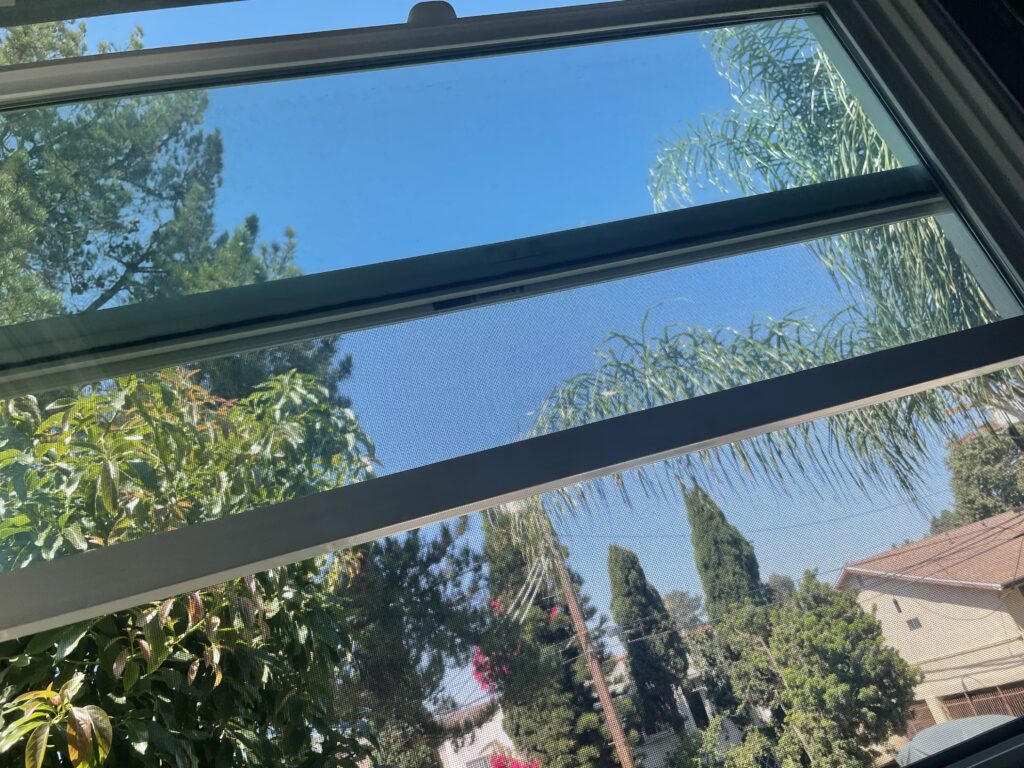
Photograph by Claudia Ross.
A sign on the dried grass in front of my apartment building named it the Isles of Charm, a label that suggested—correctly—the irony of the complex’s eventual decay. I moved in on a COVID-era deal, meaning I could afford a studio unit in Los Feliz, though only the kind with communal laundry machines that smelled like Tide pods and urine. The walls were thin, and that was how I met my neighbors.
I shared a hallway and one tiled wall with Brian and Luciana. Brian and Luciana kept their door open all the time, to let the wind in. The distance between their lives and mine was a door screen and the stuttering hum of my air conditioner. I heard everything. They were older than I was, in their mid-thirties or forties. It wasn’t sex, though their arguments occasionally seemed to have an erotic fervor.
“I never loved you,” he would scream.
“You’re a garden-variety narcissist,” she would yell back.
They made up quickly. The morning after a catastrophic meltdown, Luciana would reappear, bouncing down the stairs with their neatly trimmed terriers in tow. They both had matching bumper stickers on their Volkswagens that read WHO RESCUED WHO? with a paw print next to the text. He worked freelance in movies and bought nice leather sneakers. She drank green juice and spoke lisping Barcelona Spanish on the phone. They captivated me. I didn’t understand them at all.
There wasn’t much else going on. It was 2020 and I worked admin for an artist just south of Los Angeles proper. At the office I made batches of bad, overly strong coffee. I coordinated shipping, also badly. Everything was always held up at customs, which felt telling, an international referendum on my abilities. When the boxes arrived at their destinations, I was envious. I imagined myself inside cardboard, headed to Paris or Shanghai.
It was a good job—regular bonuses, champagne at Christmas—but my boredom felt existential. My neighbors were more compelling. At night I came home and lay on the vinyl floor of my studio, my feet touching my fridge, my ear at the doorjamb. Then I waited for Brian and Luciana to start fighting, and they did, like clockwork.
Over time, their arguments grew repetitive. There were more versions of the phrase “I wish I had never met you” than I thought possible. It was a sign, I assumed, of an imminent breakup. It couldn’t go on like this. Soon Brian would move out, and I would buy HBO, or whatever, to entertain myself after work. I would finish that short story. Outside my window, in spring, I would watch the jacarandas bloom.
Instead my landlord cut the jacarandas down. One March night I lay on the floor and heard a door open—their door. Luciana told Brian that it was over. This wasn’t anything new.
“I’m done,” she said.
“I need you,” Brian said.
I heard the two phrases repeat once, and then again, word for word, inflection for inflection. This was abnormal: an exact playback of their conversation. Finally another voice came, interrupting the exchange. The voice was deeper than Brian’s. I briefly contemplated the idea that they had a third—that they were a throuple, a polycule. An exciting twist in the plot. The other man spoke again, more clearly.
“Cut,” he said.
Curious, I staged a trip down the hallway, pretending to check my mailbox. Through their screen door, I saw them: two enormous desktop computers. On each of them was the same frozen, paused image of Brian and Luciana, both crying. Below the images were editing timelines, filled with clips and audio files. Brian clicked play. All the real, raw confessions of feeling I thought I’d heard—they were just bad dialogue.
I took a couple more walks by Brian and Luciana’s apartment in the next months, confirming what I already knew. The demise of their relationship, the one I’d witnessed—or thought I’d witnessed—was actually the rough cut of the movie they were making together. Eventually I saw part of the credits, peeking through their screen, which listed Brian and Luciana as codirectors-writers-actors-producers. Their fights weren’t evidence of suffering. They were a part of what everyone in Los Feliz had but me: “a feature.”
Listening to them lost its Rear Window thrill. I learned instead about the surprising number of home soundproofing options on Amazon. None of them worked very well. I duct-taped foam to the wall above my stove and asked Brian, politely and then not so politely, to shut their door. I finished the short story. I still don’t know what the movie was called or if it even came out, but I don’t need to see it; I already know what happens.
Claudia Ross is a writer from Los Angeles. Her fiction and criticism have appeared in The Baffler, ArtReview, Joyland, Forever, and others. She is working on a novel about archives, television, and gynecology.
from The Paris Review https://ift.tt/eTwUsDc
Comments
Post a Comment